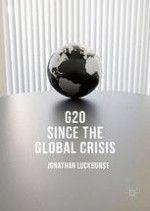2016 | OriginalPaper | Chapter
2. Strategic Economic Effects of the GFC
Author : Jonathan Luckhurst
Published in: G20 Since the Global Crisis
Publisher: Palgrave Macmillan US
Activate our intelligent search to find suitable subject content or patents.
Select sections of text to find matching patents with Artificial Intelligence. powered by
Select sections of text to find additional relevant content using AI-assisted search. powered by
